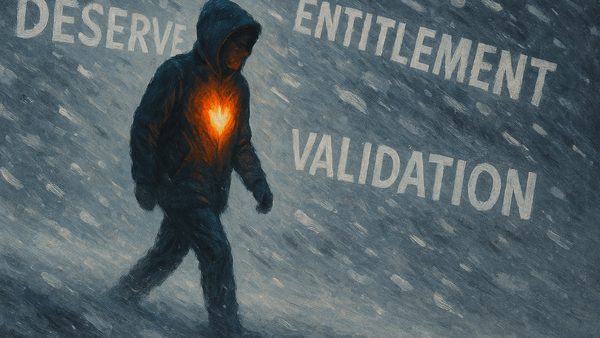How to Know and Do What Is Right
You abandoned your ability to fully trust your own truth to know and do what is right. Reassess external dogma and reclaim your integrity.

You instinctively know what is right. Your physical incarnation in this world has been constructed in a way for you to intuitively know what is right. Any being can only then persist and continue to exist, individually and cross-generationally through its ideas and offspring, if it does what is right. Any being who continuously does what is wrong will ultimately cease to exist; depending on its level of consciousness, this process of dying will be marked by suffering, pain, and being miserable and discontent.
Right is the foundation of our existence, which is good in itself, just the way it is.
And God saw every thing that he had made, and, behold, it was very good.
The single best agent for your morality—the concept of differentiation of intentions, decisions, and actions between right and wrong—is your reward system. It has been designed to make you experience desirable feelings or emotions, aka “to feel good”, when you do what is right.
The reward system motivates animals to approach stimuli or engage in behaviour that increases fitness (sex, energy-dense foods, etc.). Survival for most animal species depends upon maximizing contact with beneficial stimuli and minimizing contact with harmful stimuli. Reward cognition serves to increase the likelihood of survival and reproduction by causing associative learning, eliciting approach and consummatory behavior, and triggering positively-valenced emotions. Thus, reward is a mechanism that evolved to help increase the adaptive fitness of animals.
So if you struggle to identify what is right, the only thing you need to do is change your behavior until you experience what is right, on an actual level within the framework of your own body. This is your truth.
Any standard that a person believes should be universal or body of standards or principles derived from a code of conduct from a particular philosophy, organized religion, or culture is nothing but an inferior effigy of your ultimate individual truth, your direct unobstructed connection to Nature, the Universe, or God, if you will. External moral systems contrast your internal moral system. The bad news is, that your internal moral system most likely is nothing but a puny shadow of what it’s supposed to be; a bright-shining star of directing integrity that guides you through the darkest of times on your life’s journey.
- Example 1: Your desire to eat sweet is right because sweetness comes from cellular-bound sugar which is typically provided by fruit that nurtures your body with carbohydrates, water as well as essential vitamins and minerals.
- Example 2: Your desire for affection of your family or a certain community of people is right because human survival vastly depends on the inclusion and support of social groups and interactions.
- Example 3: Your desire for sexual intercourse is right because biological procreation is essential for the survival of any species.
You Are Being Manipulated
Fortunately or unfortunately, humans are one of the few species—if not the only one—capable of consciously manipulating their own reward system and utilizing it for objectives beyond the individual’s interests. Millennia of manipulation and self-domestication have led us to heavily rely on external moral systems instead of building and trusting our own.
- Example 1: Producers of soft drinks use exaggerated sweetness, not only to simulate the juice of fruits, which our reward system associates with essential nutrients, but also to surpass the other fruits in their perceived nutritional value. The objective is profit.
- Example 2: Parents reward their offspring with financial and emotional support as well as care, inclusion, and protection in the family in exchange for them serving the parents’ needs and desires and living up to their expectations and moral standards. Disobedience or the pursuit of conflicting needs and desires bears the threat of excommunication from the family. The objective is power.
- Example 3: Organized religion restricts the pursuit of sexual relationships by establishing means of punishment (e.g. “if you have sexual intercourse outside a standardized form of marriage, you will lose privileges in the community or the afterlife”) and reward (e.g. “committing to the concept of marriage allows you to satisfy your sexual needs and desires”). It does not tolerate other gods or value systems. The objective is power.
Ever since humans have developed this capability of self-manipulation, they have been experiencing the ever-present battle of what has been coined Good and Evil. One essential aspect of this dichotomy is rooted in teachings that liberate and such that only pretend to liberate but in effect enslave.
The former raise the level of consciousness to enable the individual to choose what is right in the sense of serving themselves and the world. The latter in effect enslave the individual to enable the agenda of a small elite group.
- Example 1: Soft drinks typically pretend to liberate their consumer because they’re being advertised characteristically with associations like social connections and status, happiness, or fruit. The truth is that Sprite and Fanta are not required for social connections or happiness, nor have these products ever seen an orange or a lemon. Therefore, substituting fruit with soft drinks is treacherous, a tile on the path that leads to suffering. In contrast, a program that educates about nutrition tends to be liberating because it aims to support the process of raising consciousness and resetting a manipulated reward system. Picking fruit over soft drinks requires a high level of consciousness and understanding.
- Example 2: Family structures typically pretend to liberate their members because they simulate relationships of love and unconditional emotional and material support. The truth is that this love and support depends on the offspring’s compliance with the moral standards of the family as well as the act of serving the expectations, needs, and desires of the other family members. In contrast, some forms of co-living communities are based on reciprocity and participation to the extent of the individuals’ abilities, boundaries, and morality.
- Example 3: Organized religion typically pretends to liberate its followers because it advocates spiritual salvation. The truth is that this salvation is dependent on the display of a specific desired behavior and is often used to justify acts that are contrary to contemporary morality, such as massacres, misogyny, and slavery. In contrast, forms of bodywork like Yoga tend to be liberating because they are meant to create awareness for the body and mind to find salvation in oneself.
Do capitalistic companies, families, and organized religions always enslave their followers and nutrition courses, alternative communities, and Yoga always liberate them? No. In fact, the core idea of some religions is to support people in liberating themselves by providing a proven code of conduct as a practical means to foster the adoption of higher levels of consciousness and integrity. Some tenets include not blindly following the given teaching without reasoning. Similarly can the nutrition course be treasonous if it’s based on dogma instead of empowerment and disguises itself as a liberating teaching. There is a lot of darkness to be found in the world of spirituality as well as in organized religion. Finally, some family structures are indeed built on the virtue of unconditional love instead of manipulation, if the head of the family has a high level of consciousness.
Inhibitors of Knowing What Is Right
Inhibitors represent external moral systems that prevent you from your intuitive knowing of what is right by creating a dependency. Their common denominator is that they serve the objectives of an external entity instead of the individual. There are three main inhibitors:
Manipulation of Incentive Motivational Salience. The exploitation of the human “wanting”, the desire or craving for a reward and motivation—which is primarily regulated by dopamine neurotransmission in the mesocorticolimbic projection—by setting new levels for satisfaction with recurring strong stimuli for the subject to become dependent on these stimuli; e.g. addiction fostered by companies operating in the consumer industry.
Conditioning. The exploitation of basic human behavioral mechanisms; e.g. by parents and family members, teachers, friends, media, and other societal customs and institutions. The three most important types of conditioning in this context are the following.
- Classical conditioning: Behavioral procedure in which a biologically potent stimulus is paired with a previously neutral stimulus as well as the learning process that results from this pairing, through which the neutral stimulus comes to elicit a response that is usually similar to the one elicited by the potent stimulus.
- Operant conditioning: Increase of the rate of specific behavior through the five types of reinforcement.
(1) Positive reinforcement (desirable event or stimulus is applied; rewarding)
(2) Negative reinforcement (aversive event or stimulus is removed or prevented from happening)
(3) Positive Punishment (aversive consequence is imposed through the application of an unpleasant event or stimulus)
(4) Negative Punishment (aversive consequence is imposed through the removal or withholding of a pleasant event or stimulus)
(5) Extinction (ignoring of behavior) - Fear conditioning: Association of an aversive stimulus with a particular neutral context or stimulus by pairing, resulting in the expression of fear responses to the originally neutral context or stimulus.
Organized dogma of morality. Any religious, philosophical, ideological, or spiritual code that claims incontrovertible truth and enforces compliance through conditioning; e.g. the Roman Catholic Church, Communism, Feminism.
Distinguishing Serving from Distracting Teachings
How do you recognize these inhibitors? How can you distinguish between a religion or ideology or spiritual concept that is designed to exploit you from the one that serves your liberation and guides you into the ability to truly choose right and wrong, to develop your own morality, through deconditioning and resetting of a manipulated reward system? How can you distinguish between what is right for you from what just appears to be right, although it is in effect treasonous and drags you farther away from your truth because you are being taken advantage of through addiction or conditioning by individuals or organized moral systems? Tricky, right?
Treasonous is any entity that tells you what is right and wrong instead of encouraging and showing you to know from within what is right and wrong without instruments of coercion or obligation.
Know thyself.
The next time you get exposed to any external code, concept, ideology, custom, philosophy, media, or add campaign, ask yourself:
- Are you told what is right or are you taught to assess for yourself what is right?
- Are you told to accept or are you encouraged to question?
- Is your intuition negated or are you inspired to think and feel?
- Are their motives and reasons revealed to you or not?
Apply these questions both to the concept as well as to the person teaching it to discover frictions. Oftentimes the concept has liberating qualities, however, the teacher does not fully embody the teaching or pursues other covert objectives, e.g. sexual misconduct of a spiritual practitioner.
Doing What Is Right
Now that you know how your perception of right and wrong is being manipulated and how to distinguish liberating from treacherous teachings, what is left, is to do what you’ve identified as right.
- A great business or creative idea pops up in your head and you soon start to question its feasibility as well as your friends’ and family’s reaction.
- You feel the need to change your environment or company during an event to feel comfortable and you resist because of the possible social consequences.
- You see an attractive man or woman reading in a café, you feel the impulse to strike up a conversation and imminently question your motives, the purpose of such a move, or the reaction of the other person.
- You encounter a person who seems trapped in a difficult social situation in a public space, you feel the need to help or support them and you immediately start doubting the appropriateness and the consequences to your reputation.
- You feel the desire to express your unfeathered opinion during a casual chat with your friends about the latest political topics and hesitate when you recognize that your opinion is contradictory to the one of the group.
You instinctively know what is right. Nevertheless, you might experience the constraints of one of the following:
- You doubt whether your senses truly guide you in the proper direction. You don’t trust your truth.
- You are afraid of the rejection of the other individual or social group and therefore of the threat to your truth as part of your identity.
- Your mind tells you it is inappropriate to express your truth because of its specific conditioning.
- Your mind tells you it is inappropriate to express your truth because it would conflict with an external moral system, manifested in an ideological, religious, philosophical, or other dogmatic code, that triggers punishment.
(Note: If you consciously chose a specific dogma and either fully understand it or believe in it, you wouldn’t experience constraints of your truth because it would align with the external moral system.)
All the situations of discontent described above come from the friction of an inner conflict between your sense of what is right and your fear of pursuing what is right. Ultimately, all experienced constraint comes down to fear.
You might remember the quote from last week’s issue The Price Of Morality from Heath Ledger aka The Joker in The Dark Knight:
Their morals, their code … it’s a bad joke. Dropped at the first sign of trouble. They’re only as good as the world allows them to be.
The external moral systems of the world aim to dictate to you what is right, respectively “allow you to be good” to a predefined extent. The process of externalization and centralization of morality has taken the burden of responsibility and self-awareness off your shoulders. For the benefit of standardization and simplification, but at the cost of disconnection from your truth, resulting in a fear response of its pursuit.
You must practice acting on what is right for you and not what you’re told to be right if you want to live a life of love and liberation. This requires integrity. It requires you to explore and to seek to understand your own truth and finally to express that truth regardless of your fears.
You must practice conquering your fears. Otherwise, you cannot do what is right. Doing what is right requires facing your fears, experiencing your fears in all their facets, knowing them and becoming home with them, and eventually acting regardless of their presence.
Did you enjoy this article? Please consider contributing to this publication’s financial freedom.
Flows straight into content, not coffee.




